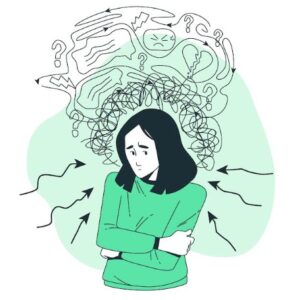As we enter week 2 of Mental Health Awareness Month, we are going to discuss a topic that many of us are familiar with: anxiety. Many people struggle with anxiety, some more than others. General Anxiety Disorder (GAD) affects 6.8 million adults, or 3.1% of the U.S. population.
Anxiety: that familiar knot in your stomach, the screaming thoughts that refuse to be quiet, the suspense of what could go wrong. For many, anxiety is synonymous with discomfort, fear, and a desire to escape its grip. And while it may seem like a self-contradiction, anxiety serves a purpose and may even be beneficial to our well-being. In this blog, we dive into the complexities of anxiety, exploring why it’s good for you, even though it feels bad.
The Nature of Anxiety:
Let’s first understand what anxiety is. At its core, it is a natural response to stress or perceived threats. It is our body’s way of signaling danger and preparing us to respond; many times, this is referred to as the fight-or-flight response. While occasional feelings of anxiety are normal and even adaptive, excessive levels can become debilitating, usually interfering with daily life and well-being.
The Benefits of Anxiety:

- Heightened Awareness: Anxiety sharpens our senses and increases our attentiveness to potential threats. In moments of anxiety, our attention becomes laser-focused, allowing us to notice details and cues that we may otherwise overlook. This heightened awareness can help us navigate challenging situations more effectively and make better-informed decisions.
- Motivation to Act: Anxiety can be a powerful motivator, propelling us into action in the face of adversity. The discomfort we feel when anxious often pushes us to address underlying issues or confront our fears head-on. While crazy to perceive, anxiety can provide the impulse needed to take proactive steps toward improvement.
- Enhanced Performance: Contrary to popular belief, moderate levels can enhance performance in certain situations. Known as “optimal anxiety,” this state lies between feeling too relaxed and too anxious, where we experience a heightened sense of arousal and focus. Athletes, musicians, and public speakers often report performing at their best when they’re slightly anxious, as it boosts their energy and sharpens their concentration.
- Warning System: This also acts as an internal alarm system, alerting us to potential dangers or threats to our well-being. Just as physical pain signals injury or illness in the body, anxiety signals emotional or psychological distress. By paying attention to our anxious thoughts and feelings, we can find underlying issues, address them proactively, and take steps to protect our mental health.
Embracing the Discomfort.

While acknowledging the benefits, it’s essential to recognize that not all anxiety is helpful or productive. Chronic or excessive levels can have detrimental effects on our mental and physical health, leading to chronic stress, insomnia, and even aggravating existing health conditions. It is crucial to find a balance between harnessing the benefits and managing its intensity through healthy coping strategies such as mindfulness, relaxation techniques, and seeking support from loved ones or mental health professionals.
Despite its painfulness, anxiety serves a purpose in our lives. It heightens our awareness, motivates us to act, enhances performance, and acts as a warning system for potential threats. By reframing our relationship with anxiety and embracing the discomfort it brings, we can harness its benefits and navigate life’s challenges with resilience, courage, and self-awareness.
Reminder: if you need help or just someone to talk to, the Suicide and Crisis Lifeline is always available. Simply dial 988.
Parmele Law Firm. Guiding you with integrity, competency, and experience.
